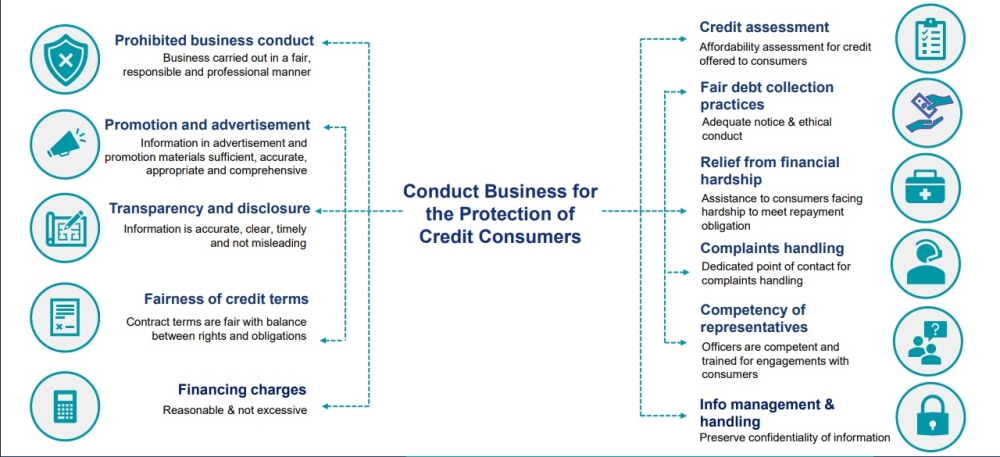KUALA LUMPUR, March 24 — On March 4, the federal government tabled the long-awaited Consumer Credit Bill (CCB) in Parliament to better enhance regulatory oversight and consumer protection in the growing non-bank credit industry.
A pursuit since 2020, the overarching Bill will establish a comprehensive regulatory framework for credit providers, particularly those offering “buy now, pay later” (BNPL) schemes, requiring them to adhere to a minimum standard of fair treatment and conduct.
At present, there are multiple laws and ministries governing consumer credit activities offering varying levels of protection accorded to consumers, leading to borrowers' confusion on parties responsible over arising issues.
While the Bill awaits further debate in Parliament, Malay Mail looks at the main takeaways of the legislation.
Establishment of a commission
Part II of the proposed Act contains provisions relating to the establishment of the Consumer Credit Commission (CCC), its functions and powers.
According to Clause 9 and 11, the CCC board shall consist of up to nine members — appointed for a three-year term — including one member representing the Finance Ministry, Bank Negara Malaysia (BNM) and the Securities Commission Malaysia (SC).
The main functions of the CCC will be to regulate credit businesses and credit service businesses that are unregulated by any authority; advising the federal government and the Finance Minister on national policies affecting consumer credit; and strengthening the conduct regulation and promoting the sustainable development of the consumer credit industry.
In its simplest form, the establishment of the CCC is intended to regulate all non-bank credit providers and credit service providers; while protecting credit consumers from unfair and deceptive business conducts.

Enforcement and punishment
Part IX of the proposed Act contains provisions relating to a Regulatory and Supervisory Authority’s (RSA) powers to institute administrative, civil enforcement (compounding) and criminal actions in addressing breaches of conduct by their regulatees.
Per Clause 34(1) of the Bill, the recognised RSAs are namely:
- The CCC
- BNM
- Ministry of Domestic Trade and Cost of Living
- Ministry of Housing and Local Government
- The Malaysia Co-operative Societies Commission
These RSAs are also empowered to impose monetary penalties, examine or investigate the business and affairs of a credit provider or credit service provider; impose standards or guidelines on business conduct and credit consumer protection matters; and publish any enforcement or supervisory action taken.
Malay Mail also took a look at some of the severe offences listed and their proposed punishment.
Under Clause 40(2), any person found carrying out an unlicensed credit business is liable for a fine not exceeding RM5 million or jail up to five years or both.
For non-compliance of licensed credit service providers, it is punishable with a fine up to RM1 million or jail up to four years or to both under Clause 42(4); while those refusing to cease operation following a licence suspension or revocation is liable to a fine up to RM5 million or jail up to five years or both under Clause 52(4).
Clause 87(1) also seeks to prohibit any person from engaging in any prohibited business conduct such as misleading or deceptive conduct in relation to credit services offered, and exerting undue pressure, harassment, or threats in seeking repayments.
Those convicted of such an offence are also liable to a fine up to RM5 million or jail up to five years, or both.
Clause 112 also provides the punishment for the offence of making false, concealing or destroying entries in any documentation relating to the business affairs of a credit provider or credit service provider.
The offence also provides for a fine up to RM5 million or jail up to five years, or both.
Per Clause 115, those found attempting or abetting an offence are also liable to the penalties provided for said offence.

Protection
For whistleblowers, those who disclose in good faith to a RSAs of their knowledge or information that a recognised offence has or will be committed are also afforded protection.
Per Clause 120, the whistleblower's identity will be kept secret (unless disclosure is given with consent) and said person shall not be liable for a breach of a duty of confidentiality imposed by any law, contract or rules of professional conduct.
Clause 130 affords protection against suit and legal proceedings, namely the finance minister, the CCC and its members, persons and committee members employed by the RSAs for acts done in the course of performing their functions.
This means no action, suit, prosecution or other proceeding shall be brought, instituted or maintained in any court or before any other authority against those named above.
Recommended read:


















